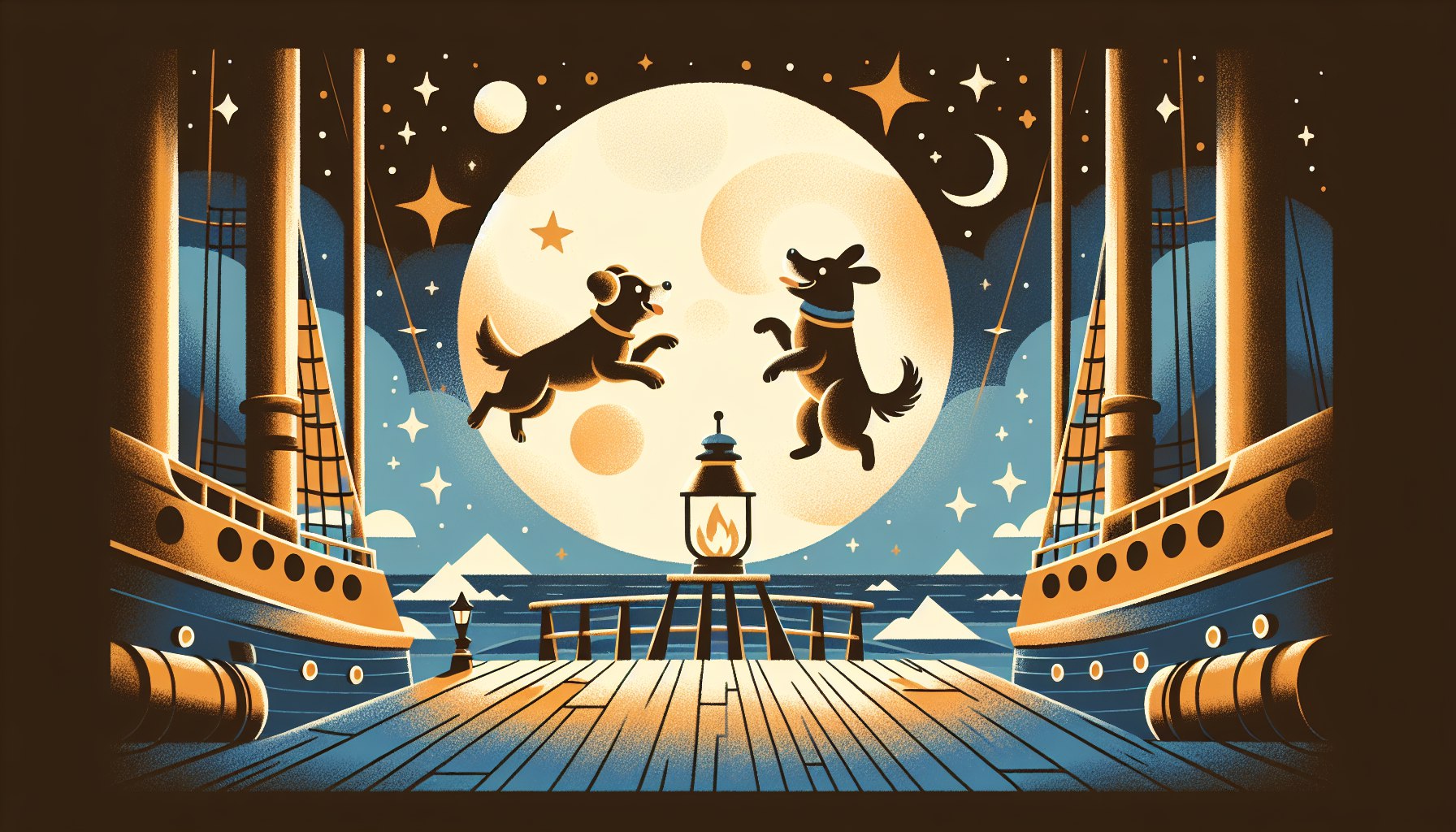Chapter I — The Whirlwind Pair
By day they chased gulls that had nothing to do with the wind. By dusk they wrestled the flags until the mast applauded. At dawn they found every sunbeam and made it bounce. They greeted the lanterns like old friends, circled the helmsman like twin whirlpools, and left a trail of joyful disorder across the deck.
Their energy was not mischief alone; it was a song of life. Yet, for all their good-hearted tumult, there was a curious consequence: the more they moved, the less they paused. And because treats—small, crinkly parcels of sea-sweet biscuits and fish-flakes—arrived only when a paw stayed still, Pip and Lark rarely collected crumbs of reward.
Chapter II — The Chase of Stars
One particular night the sky was a velvet map. Lanterns hung like small harbor moons. The Captain watched from the binnacle with eyes like slow comets and thought on a lesson that had nothing to do with orders and everything to do with hearts.
“Energy,” the Captain mused, “is a current. It must sometimes be sailed, sometimes anchored.”
Pip and Lark took these words in stride—quite literally. They found a silver fish-shaped shadow and pursued it past the bell and into the net of starlight. They leapt over ropes and through puddles that mirrored the sky until their tongues hung like pennants.
All the while the treat-basket sat patient on a low barrel. It made no complaint. It simply waited, like a tide that knows when to return.
As the chase continued, the crew started to notice the pattern. The baker would offer a morsel, then Pip would spin and Lark would vault, and the morsel would become a flying legend before it touched a mouth. The carpenter would tuck a crunchy square into a pocket and by the time he reached the dogs they had found a new constellation to orbit. The treats were generous; the dogs were busy.
There is something noble in boundless energy. It pulls at stars, it wakes the sea. Yet evening after evening, the Captain felt a gentle tug of worry. He did not scold. He simply lit the lanterns with a steady hand and set something else afloat: a plan cast in patience.
Chapter III — The Quiet Treat
The next night, the Captain placed the basket where the moonlight would kiss it and called a small, private muster on the quarterdeck. No trumpets. No dramatics. Only the hush that falls when even the waves lean forward to listen.
“Tonight,” he said, “we will teach two bright hearts a new kind of navigation—one that guides feet toward stillness when stillness is a harbor.”
He began with a story. It was not about treats but about a little sea-sparrow who could not rest until she had learned to fold her wings. The tale folded like a map, then softened, and with every gentle sentence the deck grew softer underpaw.
Pip cocked his head. Lark slowed his tail. The crew’s cadence matched the Captain’s voice: steady, warm, and a little coaxing. The lanterns breathed amber. The ship became an island of calm in a busy, breathing sea.
At first the dogs tried to translate the pause into motion—a paw, a wiggle, a hopeful hop. Each attempt was met with the Captain’s patient gaze and a smaller story, then silence to let the lesson sink like a pebble into shallow water.
It was not obedience that did the trick, nor a command carved of iron. It was curiosity turned inward. Pip discovered the shape of one steady breath. Lark noticed how the horizon did not run away if he did not chase it. Their eyes, which had always caught light like nets, began for one small orbit to catch stillness instead.
When at last Pip rested a chin on a paw and Lark lay beside him, the basket was near but not offered as a bribe. It waited like a patient tide. The Captain rose, his voice a soft bell, and placed two treats gently at their noses.
They tasted them with the solemnity of sailors who have found a calmer sea. The flavor was ordinary, the moment extraordinary. The treats did not come because the dogs had been quiet to please someone else; they came because they had learned how to carry their own joy without letting it spill into every seam of the ship.
The crew cheered in that muted way sailors cheer—clapped hands, winked eyes, the sound of a kettle’s steam. The baskets from that night onward still sat where lantern-light fell, but now they were part of the voyage’s rhythm: movement and pause, chase and biscuit, wind and anchor.
Epilogue — A Little Compass
Pip and Lark never stopped being whirlwinds. They still tumbled with gulls and made moons jealous. They learned, though, that energy is a compass with two points: one that points to adventure and the other that points to the quiet shore where a small reward waits for a moment of rest.
The Captain watched them often, pleased, as one watches stars alter their courses: with patient delight. For the sea and its small creatures teach him what maps cannot: that sometimes the greatest gift is the knowledge of when to chase and when to sit and be given a treat because you know how to be still.
